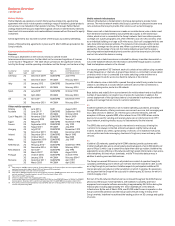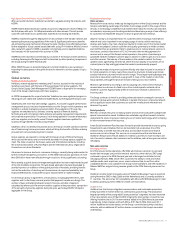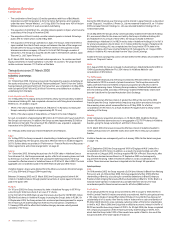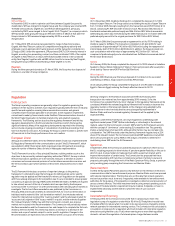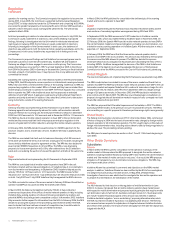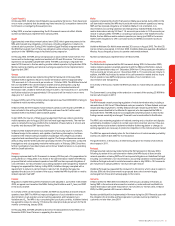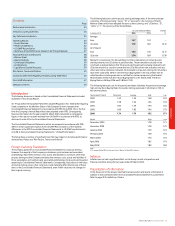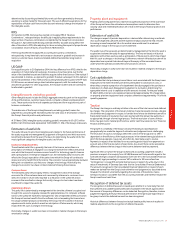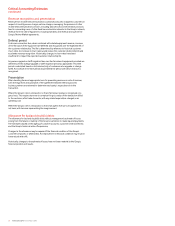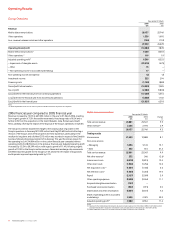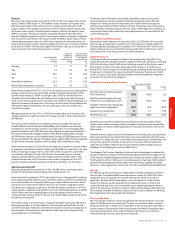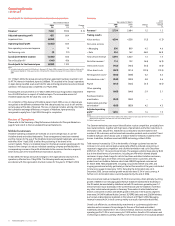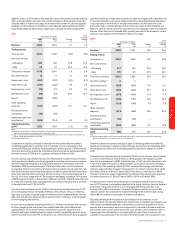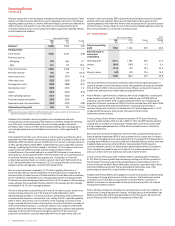Vodafone 2006 Annual Report Download - page 26
Download and view the complete annual report
Please find page 26 of the 2006 Vodafone annual report below. You can navigate through the pages in the report by either clicking on the pages listed below, or by using the keyword search tool below to find specific information within the annual report.24 Vodafone Group Plc Annual Report 2006
Regulation
continued
Joint ventures
Fiji
Vodafone Fiji has been required to make wholesale and retail price reductions of
between from 15% to 70% for a range of services. In December 2005, Vodafone Fiji
issued proceedings to prevent the government from issuing a second licence in breach
of Vodafone’s exclusivity rights.
India
From 1 March 2006, a new Interconnection Usage Charge regulation became effective.
Interconnection charges remained at Rs.0.30 per minute. However, changes were made
to reduce by 33% the total access deficit charge paid by operators to BSNL. It is
proposed that the charge be removed by the 2008 financial year.
In March 2006, the NRA recommended to the Department of Telecommunications that
mobile number portability should be implemented by 1 April 2007.
In November 2005, the government announced a lifting of the foreign direct investment
ceiling from 49% to 74% in the telecom sector, subject to certain preconditions. The
deadline for compliance is 2 July 2006.
The Department of Telecommunications is expected to issue a new national spectrum
policy before the end of 2006. The new policy is expected to include plans for allocation
of 3G spectrum.
Kenya
In March 2006, the Kenyan Government issued a new Information and Communications
Bill for public comment. The new legislation will replace the Communication Act 1998,
and is expected to be finalised before the end of 2006.
In April 2006, the NRA commenced a review of interconnection and retail prices, which
may result in new interconnection and retail price regulations.
Safaricom, Vodafone’s joint venture, has been given until December 2006 to relinquish
2.5MHz of paired 900 MHz spectrum in return for the allocation of 1800MHz spectrum.
It is proposed that the relinquished 900 MHz spectrum will be given to a new third
mobile licensee. In September 2005, Safaricom filed an application for permanent 3G
spectrum.
Poland
Legislation implementing the EU Framework in Poland, which joined the EU on 1 May
2004, was enacted during 2004 and the Polish NRA has commenced its market reviews.
The NRA, in its review of the call termination market, proposes to find all mobile network
operators to have SMP and to impose obligations of cost orientation, transparency and
non-discrimination.
The NRA awarded a fourth 3G licence in 2005, which Polkomtel is appealing. In
November 2005, the President of the NRA initiated the process to issue a new 2G
licence. In January 2006, three companies submitted offers which are now under
consideration.
Mobile number portability for contract customers was implemented by the mobile
network operators in January 2006.
South Africa
A new Electronic Communications Bill was adopted by Parliament in November 2005,
and is awaiting signature of the President. The new Bill will replace current
telecommunications and broadcasting legislation.
An Information Communication Technologies Black Economic Empowerment Charter
(the “Charter”) is expected to be finalised in 2006. The Charter will set targets to
evaluate a company’s contribution to Broad-Based Black Economic Empowerment,
which is the Government policy to increase economic empowerment of historically
disadvantaged individuals in South Africa. Targets will be set in terms of equity
ownership, management and control, employment, skills development, procurement,
enterprise development and corporate social investment.
In May 2005, the NRA commenced an investigation to assess whether Vodacom, the
Group’s joint venture in South Africa, has major operator status, which is similar to SMP,
in the interconnection market. Vodacom has challenged the grounds for this
investigation in court, with a hearing expected before the end of 2006.
In 2005, the NRA commenced investigations on mobile pricing and handset subsidies.
Separately, in May 2005, the NCA commenced an investigation into alleged excessive
pricing of mobile termination rates. These investigations remain ongoing. Vodafone has
been notified of the commencement of judicial review proceedings of the decision
under competition law approving its acquisition of VenFin.
Associated undertakings and investments
Belgium
Belgium implemented the EU Framework during 2005. The NRA has commenced its
market reviews and in the call termination market proposes to find all operators as
having SMP and has commenced a process to develop a LRIC model to set rates. The
proposals include decreases of mobile termination rates of each firm by around 12%
every six months from July 2006 to July 2008, and confirms the existing degree of
asymmetric termination rates between the three network mobile operators.
The NRA held an initial consultation on the renewal of Vodafone’s associated
undertaking, Proximus’, 2G licence which expires in 2010.
In January 2006, the NCA conducted unannounced inspections of the offices of
Proximus seeking evidence of anti-competitive behaviour in relation to the market for
corporate customers following a complaint by a competitor. These enquiries are
continuing. If the NCA decides that there had been a breach of competition law, it would
be able to impose a fine on any operator who had committed the breach.
China
The Chinese Government is expected to award 3G licences in 2006 and to implement
related changes to its telecommunications regulatory framework.
France
France implemented the EU Framework during 2004. In its review of the call termination
market, the NRA concluded that all mobile network operators have SMP and imposed
obligations of cost orientation, non-discrimination, accounting separation and
transparency. It set a price cap for Vodafone’s associated undertaking, SFR, of 9.5
eurocents per minute from 1 January 2006. During 2006, the NRA commenced work on
a new price cap for the period from 1 January 2007.
In December 2003, a French consumers association lodged a complaint with the NCA
alleging collusion amongst the three French mobile operators on SMS retail pricing. The
NCA is still investigating this complaint. Independently, the NRA has commenced a
review of SMS termination and is consulting on proposals for wholesale price regulation
and the notification of a wholesale SMS market to the Commission under the EU
Framework. If it proceeds, the French NRA would be the first to do so in Europe. In its
consultation, the NRA proposes a price cap for wholesale termination of no greater than
2.5 eurocents per minute. In addition, following two complaints against SFR and Orange
France, the NRA ordered Bouygues and SFR, and Bouygues and Orange, respectively, to
reduce their symmetric wholesale SMS termination rates to 4.3 eurocents per message
with effect from 1 July 2005.
In December 2005, the NCA decided that SFR and the other mobile network operators
had contravened competition law during the period from 1997 to 2003 by sharing
information and during the period from 2000 to 2002 by entering into an agreement
aimed at stabilising the development of market shares. SFR has been fined
220 million. SFR has appealed against this decision.
Following the NRA’s review of the access market, the NRA proposed that all three mobile
network operators, including SFR, had joint SMP in the market and it proposed access
obligations as a remedy. The proposals were notified to the Commission in April 2005
but the NRA has subsequently withdrawn its proposals.
Switzerland
In April 2005, the Swiss NCA issued proposals finding that Swisscom Mobile, Vodafone’s
associated undertaking, had abused a dominant position in the call termination market.
In April 2006, the NCA announced that it intends to fine Swisscom Mobile CHF489
million (£216 million). Additional interconnection disputes between Swisscom Mobile
and its mobile competitors are pending.
In July 2005, the Swiss NCA started a preliminary investigation concerning access to
mobile networks. At the end of November 2005, the Swiss NRA commenced a process
to award three licences for broadband wireless access and Swisscom Mobile is
participating in an auction which will take place in the summer of 2006.


